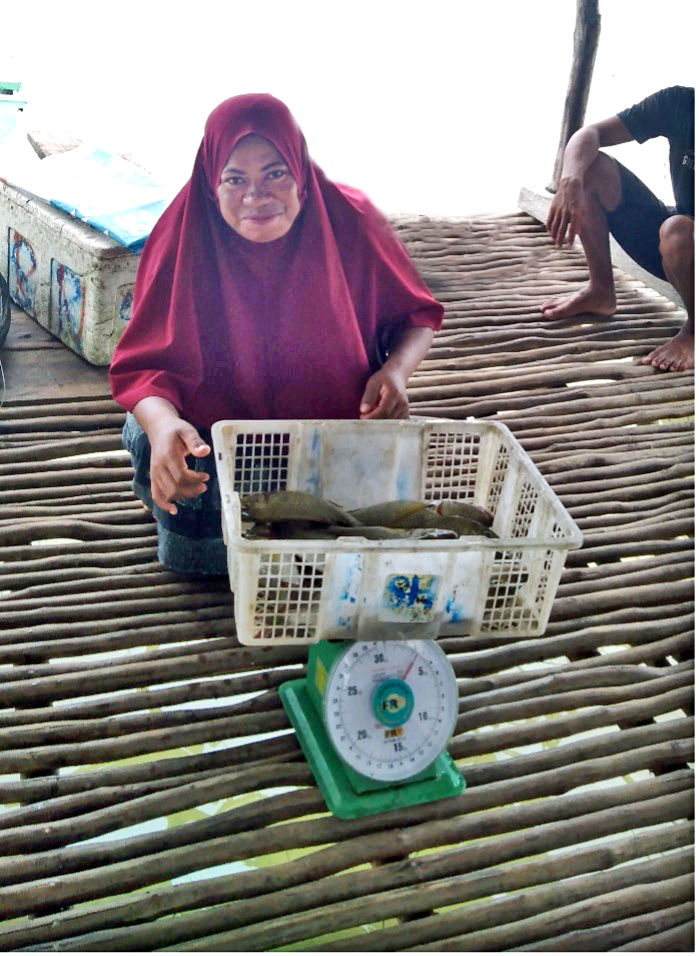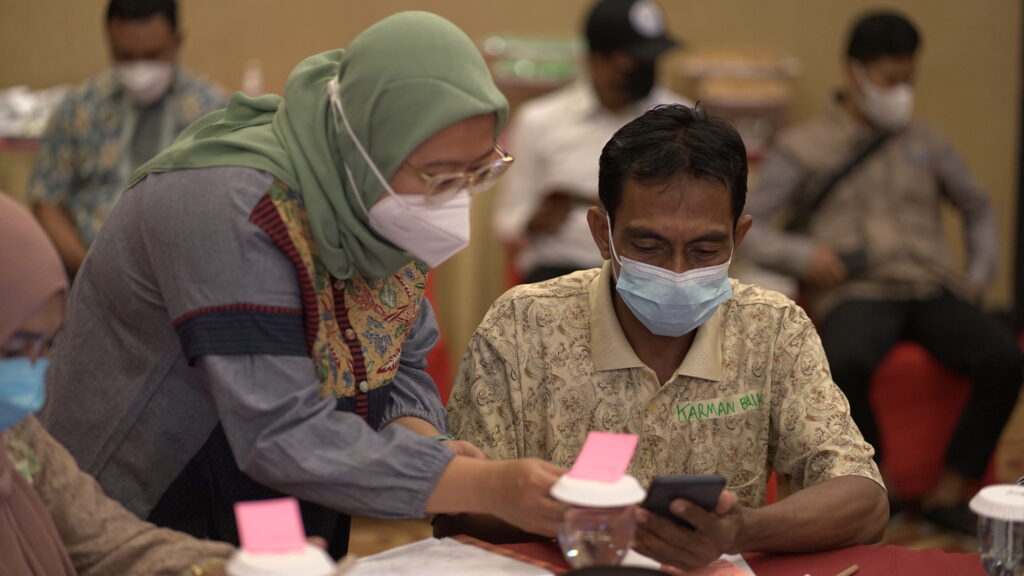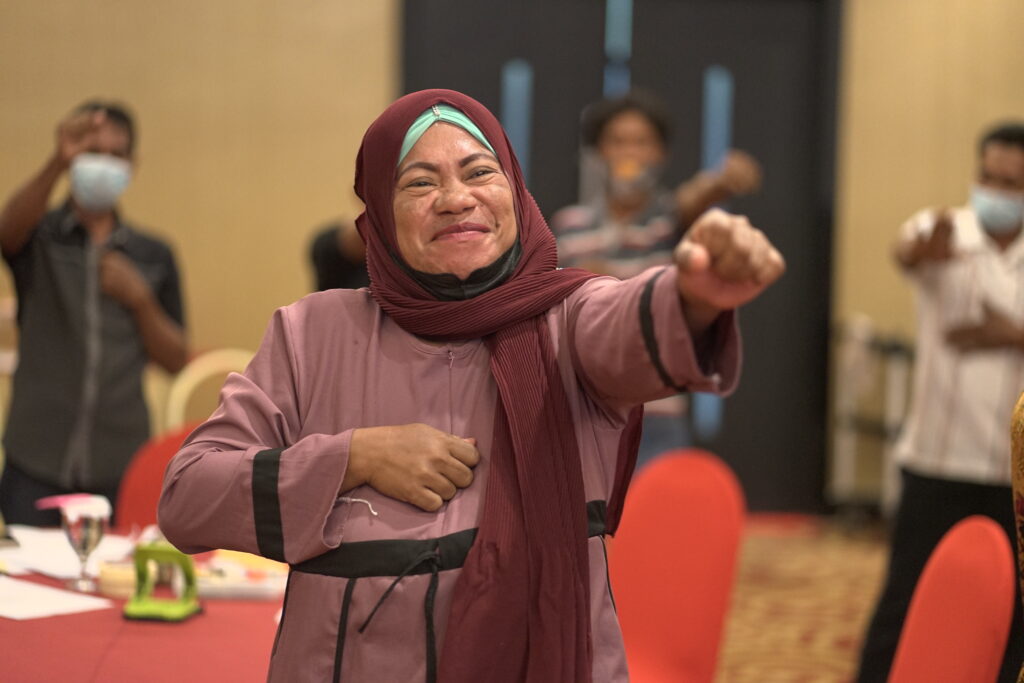If the fish are depleted, the whole fishery business is threatened, so all of us must protect the sea.”
-Jumriati, Indonesian Fish Buyer from Panambea Barata Village in Moramo Bay
Fish buying is a traditional and influential business that has existed in fisheries communities for centuries. Tens of thousands of buyers, like 38-year-old Jumriati, a full-time schoolteacher and fish buyer from Moramo Bay, operate across Indonesia. Typically, they buy fish and sell them to bigger domestic markets outside their village. Often revered by their communities for their access to business, markets and financial services, buyers like Jumriati are similarly influential in determining fish size, quality, and variety, controlling fish prices, and impacting the livelihoods and habitats upon which their businesses depend.

Jumriati and her husband, Bahar, together operate a first-level fish buying business, buying fish every day from multiple fishers. Jumriati negotiates and records transactions while her husband transports the fish to sell in nearby Kendari City. Neither has ever had formal business training, nor have they been involved in fisheries conservation or sustainability efforts— scenarios common to those working in the small-scale fisheries sector. Until now.
Rare recently met up with Jumriati at its November Microenterprise training, run by Rare and the Southeast Sulawesi provincial Marine and Fisheries Office for buyers like her, to hear more about the process of professionalizing her business within the small-scale fisheries sector. During the training, 20 fisheries microenterprises formally registered their businesses and learned new strategies for sustaining the environment and their enterprises.
Over the years, Rare has worked closely with small-scale fisheries stakeholders—fishers, traders, processors and buyers like Jumriati and Bahar—to sustain fish stocks, use data for decision-making, and enable more sustainable fisheries management and enterprise. Through its coastal fisheries program, Fish Forever, Rare supports fishers in adopting sustainable fishing practices, creating reserves and managing access to their fisheries, and adding value to their fish products, among other support. At the same time, Rare helps buyers generate financial records, diversify their customer base, access financing, become financially literate, and identify strategies and practices to protect the ocean while adapting to uncertainty.

Like fishers, fish buyers are impacted by the uncertainty related to a changing climate and a pandemic, among other challenges. The pandemic disrupted Jumriati and Bahar’s business as falling prices meant they lost many customers. They shifted strategy by selling to retailers, in addition to second buyers, and attending Rare’s microenterprise training.
Below find Jumriati’s perspective on training for microenterprise development within the small-scale fisheries sector.
Q: Why did you join the microenterprise training?
I wanted to gain experience, learn new information and to meet fish buyers who come from different districts. I wanted to meet them in person, because all this time, I just know them via the Fish Buyers’ Whatsapp group. The training was very important for me and my business. I learned about financial planning, the impact of waste on the ocean environment, and how to make a business strategy.
Q: How has your business changed since the training?
Before the training, I was confused about making financial records. In the past, I felt that my business was profitable, but could never calculate overhead costs or fixed costs such as fuel and transport fish to Kendari City. So most of the time I made losses. Now, I include all the costs in my calculations, so I am very happy and confident that I can tell that my business is profitable.
I have started to think about selling my fishes through online markets. We practiced making WhatsApp business messages and I even secured a potential customer, who wants to order my fish.
Q: What were the most important lessons you learned from the training?
Business formalization is very important. Now with a Business Identification number/NIB, we have a business identity and we have created an “official business”. Hopefully, with the NIB, we can advance our business: add more fishers, increase capital to make more investments to build the business, and diversify our customers and the markets we sell to, including online sales.
[In terms of an environmental lesson]: Because we live in a community that is heavily dependent on the sea, we get our food and our business from the sea. If we pollute the water and bomb our reef to catch fish, this means we won’t have anything left in the sea.

After the training, I changed how I dispose of waste from fish cleaning. I have also reduced the plastic waste and litter that I dispose of into the sea. It is also important to educate our fishers and the community where we live to not litter and throw our waste into the sea so that our seas can be protected. I also told at least 10 fishers about this new information.
I hope they will also reduce their waste to the sea. Because we live from the sea, we must protect it and protect the shelter and places for fish to reproduce. If the fish are depleted, the whole fishery business is threatened, so all of us must protect the sea.